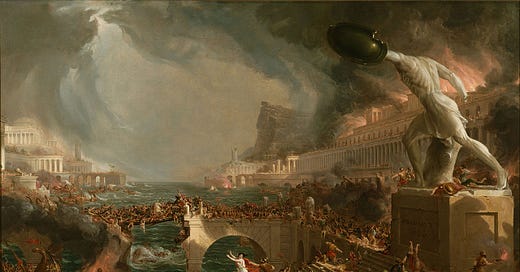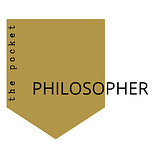Friends of Philosophy,
Today we’re going to fast forward about a thousands years from Plato, through the European dark ages to a time of renaissance and rebirth.
It’s important to set up a brief historical timeline so we’re grounded in how thought in particular evolved and struggled to survive over this time.
In many respects, thought and open dialogue are the heroes of a journey who face a thousand obstacles on their path to their ultimate destiny.
Every morning I write an email exploring life through the eyes of the world’s greatest thinkers. Sign up here if you would like to receive it directly in your inbox.
A few hundred years after Plato, Greece would fall and pass along its knowledge—philosophy included—to the burgeoning empire to its West, that of Rome.
Ancient Rome was a military superpower with very little original contributions in the way of art and science. Rather, they would absorb and intermingle with whatever culture they conquested during their thousand years or so of military campaign.
However, as it relates to Greece there was a special relationship in that most of Roman religious and philosophical work was based directly off of Greek myth and thought.
It’s also important to note that in their conquest Rome did create an original contribution, and that was a strong dose of patriarchal norms which were actually injected into the western psyche. Particularly, Rome infuses the concept of effeminate and masculine characteristics in a way that had not been done by an empire to that point, and set effeminate characters beneath those of masculine.
As Rome absorbed Greece and its culture, there was special care to demonize everything Greek, and change Greek ideas into new Roman ones. This is why the myth, stories, and gods of Rome and Greece are similar but not identical.
As Rome normalized ideas of masculine supremacy they labeled everything Greek as effeminate—which to them meant weak and submissive—and everything Roman as masculine and superior. All the while, Rome would not have a religious, social, or political structure without absorbing Greek thought.
This is important to know, because as the Roman empire would evolve it would continue to work on these Greek ideas in Roman clothes until its own demise around 500 AD.
Rome’s fall then sent the world of European (or western) thought into a 500 year stretch of silence and immobility—what we now call the Dark Ages—until a renaissance began emerging around 1000AD.
From what I can gather, during the dark ages a certain breed of authoritarian and fundamentalist Christianity governed the way most people thought, if they had personal space to do much thinking at all.
Eventually this hyper-literal, authoritarian, hyper-patriarchal (thank you, Rome) Christianity gave rise to the study of history and philosophy as Europe found new ways of reorganizing, trading, and thriving once more.
At this point—from a hyper-fundamentalist lens—theologians (the philosophers of their time) began unearthing pre-Roman (i.e Greek) texts like that of Plato and Aristotle. A great debate emerged among theologians about which path to follow—that of the Platonic world of forms, or that of Aristotle’s scientific material view.
As you might imagine, it was much simpler to interpret and resonate with Plato’s world of forms and literalize a popular perspective about something like heaven and say, “see, Plato knew the logos, he knew the truth about Jesus and eternity”
This is a special skill of empires and politcal-religious institutions—to absorb ideas and meld them together to fit their own traditions and needs. In so many ways, the post-Roman Christian church was no different.
It was also in this time that a new, second wave of Christianity was being birthed under the Emperor Constantine in which many tribal ideas, old Roman/Greek beliefs, and emerging Christian thought were folded together to give rise to a type of faith that would stand until Martin Luther and even beyond.
Roman concepts of patriarchy, difference to monarchy and empire, and behavior based on reward of heaven and fear of hell ran wild. If we look about at all of those elements that came before this time, emerging from the dark ages people inherited a cosmology that was punitive, oppressive, and a strange mixture of Greek, Roman, Pagan, and Christian thought.
This is why we bring trees into the house to celebrate Christmas—a pagan ritual melded with the annual honoring of Jesus’ birth. Or during Easter, where we celebrate fertility with rabbits and eggs alongside the resurrection of Jesus.
It’s even where we get the word God (to that point often still referred to as a derivative of YHWH). God comes from the word Deus, the Latin word for Zeus—the eternal emperor. If God is an emperor, would it not make sense he would bestow his power to an earthly monarch? Notice too, God must be a he.
I say all of this to set the stage for how the philosophical ideas of Plato and his counterparts were buried in the soil of time, and re-emerged thousands of years later as a new hybrid plant, only seriously and carefully studied by a few privileged theologians.
And it is in this backdrop that Platonic dualism co-evolved with concepts of heaven and hell and dumps out European christian thought with a stark spirit-body dualism.
We have material bodies (which are temporary, and therefore available for service to a greater cause, like empire) and souls (which will either find their way to the world of forms, or descend to Dante’s inferno depending on how you spend your time with your earthly body.)
This was a very convenient cosmology that would persist until the Protestant revolution. And even then, the core ideas of duality—we have material bodies that are temporary and heavenly souls which matter the most—persists to the present day for many influenced by western thought.
I’ve found that in studying medieval thought or even Church history, such a comprehensive narrative is often missing. However, so many fundamental assumptions than millions of folks make are based off this history.
And this leaves us at an impasse in which we must step back and look at thought, that ancient dialogue as a hero who refuses to quit, and listen to what it’s trying to tell us today.
Be well my friends, don’t stop thinking.
-TPP
PS, share with a friend, if they subscribe you will both be considered for a giveaway this Friday!
References:
https://www.britannica.com/topic/Platonism/Renaissance-and-later-Platonism
https://cac.org/the-power-of-love-2016-09-25/
https://greece.mrdonn.org/fall.html#:~:text=The%20time%20period%20called%20Ancient,conquered%20Greece%20in%20146%20BC.
https://www.britannica.com/biography/Plato#:~:text=Plato's%20birth%20occurred%20near%20the,death%20in%20348%2F347%20BCE.
https://en.wikipedia.org/wiki/Fall_of_the_Western_Roman_Empire
Image:
https://en.wikipedia.org/wiki/The_Course_of_Empire_(paintings)#/media/File:Cole_Thomas_The_Course_of_Empire_Destruction_1836.jpg















Share this post